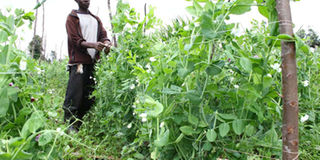Breaking News: Old Kijabe dam tragedy: Death toll rises to 45
Ask Your Agronomist: Use manure, acidic fertilisers to grow crops well in saline soil

Joel Meme tends to his peas at Kimbogo village in Mburi sub county in Meru County. PHOTO |FILE
What you need to know:
- Soil salinity affects the availability of nutrients from the soil solution and thus the uptake by plants.
- Other negative effects of salinity on plant production include inhibition of water absorption by plant roots due to the increased osmotic pressure in the soil water and poor soil physical properties like aeration, structure and drainage.
- Crops that are tolerant or moderately tolerant to salinity should be encouraged for production in such areas. These include barley, wheat, rice, sorghum and maize to a lesser extent.
Q : I live in an area where the only water available is saline from wells. I have two questions: What food crops can grow well with saline water? Second, will it affect them?
Jane
The pH of a soil and indeed irrigation water has a significant effect on the productivity of a given crop. Soil salinity affects the availability of nutrients from the soil solution and thus the uptake by plants.
In saline soils, micro-nutrients such as zinc, iron, copper and boron as well as critical elements like nitrogen and phosphorous become relatively unavailable for plant uptake, which consequently compromises yields.
Other negative effects of salinity on plant production include inhibition of water absorption by plant roots due to the increased osmotic pressure in the soil water and poor soil physical properties like aeration, structure and drainage.
Saline soils occur due to the accumulation of sodium salts in the root zone, including chlorides, sulphate, bicarbonate and sometimes nitrate sodium salts.
The presence of these salts leave the typical white coloured crust on the soil surface. These saline soils occur generally in arid and semi-arid areas, as well as areas with generally poorly drained soils.
Reclamation and management
To crop in saline soils, farmers need to embrace practices that will improve the soil drainage and increase the soil buffering capacity.
These include the use of manure or other organic matter and where possible till soils in rows and flood to leach out the soluble salts from the crop root zone.
Acidic fertilisers such as ammonium sulphate and elemental sulphur can also be used to manage the high soil pH.
Tolerant crops
Crops that are tolerant or moderately tolerant to salinity should be encouraged for production in such areas. These include barley, wheat, rice, sorghum and maize to a lesser extent.
Most vegetable crops like tomatoes and beans are sensitive to salinity and may not do well.
For crop specific fertiliser recommendations, please consult the following agronomists in your area:
Central Region: Stephen Mburu, 0728396204.
Upper Rift Valley: Daniel Mui 0702466343.For crop specific fertiliser recommendations, please consult the following agronomists in your area:
Upper Rift Valley: Daniel Mui 0702466343.
Eastern: Dennis Nyandaya, 0702466372.
Lower Rift Valley: Chris Masira, 0798498320.
Western: Eric Okwado, 0715484224.
Vitalis wafula
East Africa Regional Agronomist
Yara.
Feed back:
For all your questions on crop health, soil nutrition and fertiliser use, email:
[email protected] or [email protected].




